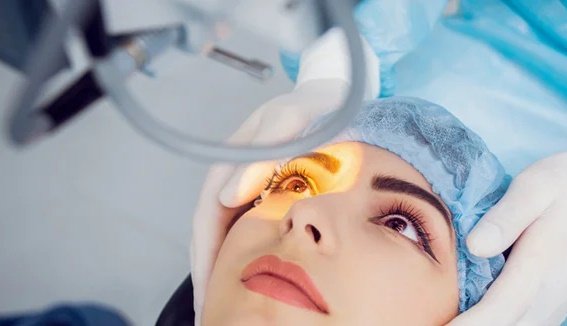Cataract In Koradi
Cataract
If you’re looking for cataract surgery options, there are several reputable clinics and experienced ophthalmologists available. Some well-known options include:
Dr. Pankaj Anantwar at Anantwar Eye Hospital & Skin Clinic, who has 16 years of experience
Cataract is one of the most frequently performed and safest surgeries in modern medicine. It involves removing the cloudy natural lens of the eye, known as a cataract, and replacing it with an artificial lens to restore clear vision. For individuals with cataracts in both eyes, surgeries are typically scheduled for each eye on separate occasions.

Who needs cataract ?
Cataract may be necessary if cataracts in one or both eyes are impairing your vision and affecting your daily activities.
Your eye specialist might also suggest surgery if they need to examine the back of your eye to monitor other conditions such as:
- Age-related macular degeneration
- Diabetic retinopathy
However, it’s important to understand that cataract surgery will only improve vision loss caused by cataracts and will not address vision loss due to these other conditions.
How do I decide if it’s time for cataract ?
Cataracts are not a medical emergency, so if you’ve just been diagnosed, there’s no need to rush into surgery. You can usually wait and plan the procedure at a time that works best for you.
In the early stages, updating your glasses or contact lens prescription might help with vision. However, cataracts tend to worsen over time. When they start affecting your ability to perform daily tasks, it may be time to consider surgery. Discuss the ideal timing with your eye surgeon based on your specific needs and lifestyle.
Types of Cataracts:
Following are the types of cataracts
- Nuclear Cataract
- Cortical Cataracts
- Posterior Subcapsular Cataracts
- Congenital Cataracts
- Secondary Cataracts
- Traumatic Cataracts
- Radiation Cataracts
How should I prepare for cataract ?
Before your surgery, you’ll meet with your ophthalmologist for a comprehensive eye exam. During this visit, your ophthalmologist will:
- Assess the overall health of your eyes
- Check for any reasons that might prevent you from having surgery
- Identify risk factors that could complicate the procedure
- Measure your eyes to determine the correct focusing power for your intraocular lens (IOL)
- Inform you if you’ll need prescription eye drops
This is also a great time to discuss any concerns or questions you may have. Consider asking about:
- The risks of surgery in your case
- The specific benefits for you
- The type of IOL they recommend
- Whether you’ll need glasses or contacts after surgery
- The expected recovery time
- When you can resume your normal activities
Remember, you won’t be able to drive immediately after surgery, so make arrangements for someone to drive you to and from the procedure.
How is cataract surgery done?
Cataract surgery is an outpatient procedure, allowing you to go home shortly after it’s completed.
During the procedure, your surgeon will:
Numb your eye: Eye drops will be used to numb the surface of your eye (topical anesthesia) so you won’t feel anything. You may also receive medication to help you relax. While you’ll be awake, you won’t see anything approaching your eye—just a rainbow of lights.
Make a small incision: A tiny cut is made in your cornea using either a laser or a blade. Typically, this incision doesn’t require stitches.
Remove the cataract: The surgeon will break up the cloudy lens (cataract) using ultrasound waves, a method known as phacoemulsification. The lens is fragmented into small pieces and then suctioned out.
Insert a new lens: A new intraocular lens (IOL) is inserted through the same incision. These lenses are usually foldable and expand into place once inside your eye.
Protect your eye: A protective shield, similar to an eye patch, is taped over your eye to safeguard it post-surgery.
After the procedure, you’ll need someone to drive you home as you won’t be able to drive immediately.
What are the benefits of cataract surgery?
Cataract surgery is the only effective way to remove a cataract and restore clearer vision. There are no medications or eye drops proven to improve vision affected by cataracts.
After the surgery, you can expect:
- Sharper, clearer vision.
- Reduced sensitivity to glare, especially from bright lights like car headlights at night.
- Enhanced color perception.
- Less reliance on glasses, depending on your case.
These improvements can significantly enhance your quality of life by making everyday tasks easier and more comfortable.

